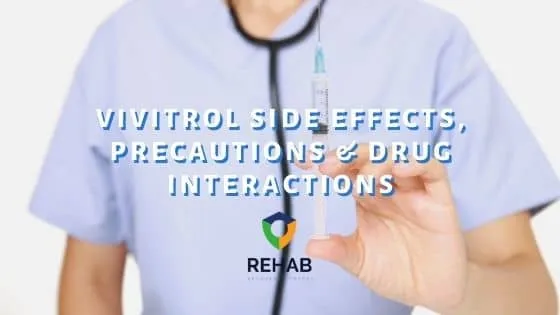Table of Contents
Vivitrol is the brand name for a medication known as naltrexone. This substance is used in the treatment of opioid and alcohol addiction, as it prevents individuals from relapsing. Naltrexone is known to prevent the euphoric effects of alcohol and opioids by blocking certain receptors in the brain.
Vivitrol is the extended-release form of naltrexone that is given in the form of a monthly injection. Vivitrol is preferable to many individuals due to its convenience.
The Food and Drug Administration has approved only three drugs for the treatment of alcohol use disorder, with Vivitrol being one of those medications.[1] Additionally, Vivitrol treatment is considered a form of medication-assisted treatment (MAT). According to the Substance Abuse and Mental Health Services Administration, this approach to treating addiction is regarded as one of the most effective approaches thus far.[2]
Common Vivitrol Side Effects
Vivitrol is considered to be one of the safest medications to use when it comes to treating alcohol and opioid dependency. However, every substance has the potential to cause side effects.
The common side effects associated with the Vivitrol injection include:[3]
- Nausea that improves within a few days
- Tiredness
- Headache
- Dizziness
- Vomiting
- Decreased appetite
- Pain in joints
- Muscle cramps
For people using Vivitrol to treat opioid addiction, these additional common side effects may occur:[3]
- Cold-like symptoms
- Trouble sleeping
- Toothache
The common side effects of this medication should fade away after a few days to a couple of weeks. If the symptoms persist or become troublesome, individuals should contact their doctor or medication-assisted treatment program.
Rare Vivitrol Side Effects
The rare side effects of Vivitrol can be severe. However, it is important to note that the administrator of an individual’s medication will observe them during their first dosage to ensure that they do not experience severe or life-threatening effects.
The rare side effects of this substance include:[3]
- Depression
- Allergic reactions (rashes, hives, or facial swelling)
- Damage to the liver like hepatitis
- Pneumonia
- Severe reactions at the site of injection
The depression associated with Vivitrol can become severe, possibly causing an individual to develop suicidal thoughts or behaviors. Keep in mind that this side effect is considered rare, meaning it does not affect the majority of users.
Additionally, the reactions that occur at the site of the injection tend to subside on their own within a short time. Unfortunately, a small number of cases have resulted in negative reactions like tissue death. These individuals must undergo surgery to remove the affected skin.
Precautions When Taking Vivitrol
As with any substance, there are things individuals should be aware of when taking Vivitrol. The following precautions are only intended to make users aware of the steps they need to take to successfully and safely use Vivitrol as an addiction recovery tool.
Hepatotoxicity
When this medication is used in excess, it has the potential to cause hepatocellular injury. In other words, overusing Vivitrol can cause damage to the liver.
According to the FDA, “The margin of separation between the apparently safe dose of naltrexone and the dose causing hepatic injury appears to be only five-fold or less. VIVITROL does not appear to be a hepatotoxin at the recommended doses.“[3]
Injection Site Reactions
Vivitrol injections can be followed by pain at the site of injection, tenderness, swelling, or bruising. When the injection is given, it is provided through a needle that was custom made for Vivitrol. If an individual is given this substance in a needle other than the one designed for its use, they may experience a more severe reaction.
Examples of severe injection site reactions include:
- Induration of the skin
- Cellulitis
- Abscess
- Necrosis
Eosinophilic Pneumonia
The FDA reported a singular case of an individual developing eosinophilic pneumonia after receiving a Vivitrol injection.[3] Patients who develop dyspnea (labored breathing) and hypoxemia (low concentration of oxygen in the blood) should consider the possibility of eosinophilic pneumonia.
Hypersensitivity Reactions
Hypersensitivity reactions to Vivitrol are possible. In some cases, individuals could develop anaphylaxis. If this occurs, the patient must contact emergency medical services immediately and end all further treatment with this medication.
Accidental Precipitation of Opioid Withdrawal
Individuals must be free from opioids before beginning Vivitrol treatment. If a patient still has opioids in their system, they will experience precipitated opioid withdrawal. Because of this, physicians must conduct a naloxone opioid test before providing patients with Vivitrol treatments.
Possible Vivitrol Drug Interactions
Vivitrol may interact with some drugs, causing adverse reactions and in severe cases, life-threatening conditions. Any opioid medication and alcohol will interact with Vivitrol in an adverse way.
The severe drug interactions associated with Vivitrol include:
- Alfentanil
- Bremelanotide
- Buprenorphine
- Butorphanol
- Codeine
- Dezocine
- Droperidol
- Fentanyl
- Heroin
- Hydrocodone
- Hydromorphone
- Leflunomide
- Levoketoconazole
- Levomethadyl acetate
- Levorphanol
- Lomitapide
- Meperidine
- Methadone
- Mipomersen
- Morphine
- Morphine liposomal
- Nalbuphine
- Oliceridine
- Opium
- Oxycodone
- Oxymorphone
- Pentazocine
- Pexidartinib
- Propoxyphene
- Remifentanil
- Sufentanil
- Tapentadol
- Teriflunomide
- Tramadol
Find Out if Addiction Treatment with Vivitrol is Right For You
If you or a loved one suffer from opioid addiction or alcoholism, Vivitrol treatment may be right for you.
At Rehab Recovery Centers, we conduct a full assessment of an individual’s health, history of substance abuse, and family history to determine the best path of treatment for them. Contact us today to determine whether Vivitrol addiction treatment is right for you.
References:
Get Help Today
Don’t go through the process of recovery alone. There are people who can help you with the struggle you’re facing. Get in touch with one today.


